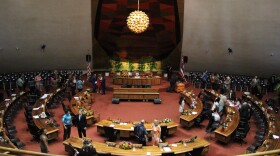State Reps. John Mizuno and Daniel Holt will introduce a measure in the upcoming session that would open a sportsbook and card room on Oʻahu.
The measure would also create a state gaming commission to oversee the licensing and enforcement of gaming facilities, as well as fund efforts to address gambling addiction.
The lawmakers held a press conference Monday to discuss their plan to further the discussion of legalizing gambling in a very limited capacity.
Both say the revenues generated from a legal game room will provide a sustainable funding source for the Department of Hawaiian Home Lands — which received a record $600 million in the 2022 legislative session.
"As we all know, gaming in Hawaiʻi is not a new topic to all of us. We've had proposals come up year after year in the past," Holt said.
"As we know, funding for Department of Hawaiian Home Lands has always been a struggle. And to have a dedicated funding source where lots of tax revenue goes to Las Vegas every year. And if we'd be able to keep that here, and have that money spent on Hawaiian homes, it'd be a very big benefit for us here today."
The proposal is still being drafted in preparation for the upcoming legislative session, which starts next week on Jan. 18.
Scope of the proposed gambling bill
According to Mizuno, Holt, and Eric Lani Ford, gaming advocate and president of Rise Hawaii Gaming, the measure will be very limited in scope and would be treated like the state's dispensary program.
"We are not proposing a casino. What we are proposing is a poker room/betting parlor," Ford said. "It would be, if you can picture, like a 24-Hour Fitness — anything from 10,000 to 25,00 square feet. We're going to request, in the bill, a minimum of 10 tables to 30 tables."
According to Ford, this model is similar to game rooms in South Dakota. Ford said the sportsbook aspect would be a brick-and-mortar operation for at least two years — unlike popular apps such as Draft Kings and FanDuel.
After two years, the licensed operator would be allowed to have an app.
The estimated revenue that could be generated from a legal game room ranges between $400 million and $800 million a year.
Details on who can apply for a gaming license are still being worked out. But general details provided by Ford, Mizuno, and Holt include a licensing fee between $50,000 and $100,000. The company must also be headed by someone born in Hawaiʻi or a 35-year resident.
When asked whether or not those charged with gambling-related crimes could qualify for a license, Ford said they could apply. However, those charged with tax evasion would be disqualified.
Addressing past opposition
Previous attempts and proposals to legalize gambling have faced opposition, with lawmakers and opponents often citing crime, prostitution, and the impact it would have on personal finances.
Holt and Mizuno believe their proposal addresses those concerns.
"If crime is associated with gambling, why is gaming legal in 48 states? And why are so many Hawaiʻi residents going to Las Vegas, with many taking multiple trips?" Mizuno said.
"The people I know who enjoy trips to Las Vegas are mostly kūpuna, not criminals. I feel it is important to discuss options to keep local money in the local economy."
According to a press release, the legislation proposes customers would only be allowed to enter the sportsbook and card room after registering with the premises and paying a daily entry fee.
Mizuno and Holt also contest that the measure would lower crime by making illegal game rooms irrelevant.
"We're taking on an industry that is currently being unregulated, and putting it into regulation and benefiting our communities at the same time," Holt said.
"Poker, being a game of skill... and not being an illegal game, this is a very responsible proposition — making sure that we're not putting people into poverty. We're really looking into this, and being practical and knowing that these things are taking place in our streets every day."
There is also the aspect of job creation upside. Ford estimates the money from a statewide network of game rooms could create between 500 and 1,500 jobs.




